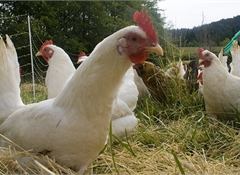News
Overwhelming opposition to battery hen cages
27 Sep 11

New Zealanders are as united in their support of the All Blacks as they are opposed to battery cages.
A comprehensive opinion poll, released today by animal advocacy group SAFE, reveals a consensus across all sectors of the population that battery hen cages should be banned, with 85 per cent of New Zealanders wanting the government to phase out cages within five years.
The nationwide survey, by Horizon Research, recently polled respondents to gauge public attitude towards the current use of battery cages, and the proposed colony cages. The survey reveals that 79 per cent of the respondents feel battery cages are cruel. Of those who buy eggs for their household at the supermarket or local market, more than 82 per cent believe they are cruel.
The survey also sheds light on whether opinions differ according to political party allegiances and whether people think the government should phase out all caged systems.
“The majority of voters for all main political parties want the government to phase out battery cages. When asked whether animal welfare laws should prohibit cages, 70 per cent of the respondents said they should. When told the government is considering phasing out battery cages and asked if they agreed with this, 81 per cent said they did,” says SAFE campaign director Eliot Pryor.
The National Animal Welfare Advisory Committee (NAWAC) is likely to recommend phasing out battery cages over twenty years. However 54 per cent of those polled said they wanted battery cages phased out within two years. 24 per cent wanted it in less than a year and 85 per cent thought it should happen within five years.
The proposal to allow colony cages as a replacement is also unpopular, with nearly two-thirds of New Zealanders either opposed, neutral or requiring more information about colony cages to make an informed decision.
“We ask the Minister of Agriculture, David Carter, whether he has confidence in the review process, given these results. The acceptance of the colony cage system would be against the wishes of the New Zealand public,” says Mr Pryor.
The poll shows 82 per cent of New Zealanders prefer to buy eggs from free range sources as opposed to buying barn eggs (61%) or caged (5.6%). “If the egg industry was doing its job it would be working to meet consumer preferences and producing eggs from free ranging hens,” says Mr Pryor.
“This poll clearly demonstrates that colony cages should not be accepted as the proposed ‘humane alternative’, given they are no more than better-designed battery cages that still cause suffering for hens.”
For more information or a copy of survey results please contact SAFE campaign director Eliot Pryor: 021 189 9226.
Footnote:
Horizon Research surveyed New Zealanders on their attitudes towards the current practice of producing eggs using battery hen cages, and views over alternative production methods being considered.
The survey was of 1,000 respondents nationwide in August 2011, with a margin of error of 3.1 per cent, across a representative sample of the New Zealand population by age, gender, ethnicity, personal income, region, employment status and party vote 2008.
Respondents were told that:
The Egg Producers Federation of New Zealand says New Zealand has about 3.3 million hens laying about one billion eggs a year. Of these, the Federation says:
- More than 85 per cent of the eggs produced are sold as table eggs within the domestic market, with the remainder used in the baking and catering industries, and
- About 88 per cent of the eggs produced in New Zealand are from conventional cage production systems, with the remaining 12 per cent being produced in free range or barn egg production systems.
Respondents were also told:
- Cage or "battery" hens are housed in small cages. Each hen has less space than an A4 sheet of paper. Some argue that the hens in these cages cannot express their normal behaviour as stipulated in the Animal Welfare Act. This includes walking around, flapping wings, dust bathing, and turning around easily.
- The Egg Producers Federation's website says keeping hens in conventional cages enables eggs to be produced on a large scale and reduces problems of animal health and cannibalism. It says that conventional cage systems allow high hygiene standards to be met, through methods such as automatic removal of manure. Feed and water supplies are also constant, so that birds maintain excellent nutritional standards and hydration.
- New battery cages are required to give birds 550cm2 of individual space, and by 2014 this will be mandatory for all cages. (For comparison an A4 sheet of paper is 623cm2.
- The Government is now considering phasing out the use of "battery" hen cages. A phase-out time of up to 20 years is one option being considered. Animal welfare groups want battery hen cages banned within five years.


